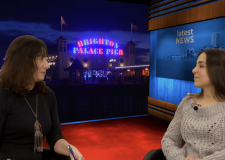Free bus travel for school children is set to end and the opinion of the parents and public is ignored
Keep the faith
More than 270 pupils are likely to lose their free bus to school as the council looks to make savings. The decision has proved controversial because almost all of the children attend Cardinal Newman Catholic School rather than their nearest secondary school. The council does not have to subsidise their journeys to and from school but may choose to do so. Traditionally it has done so. But after consulting parents and the public, it has decided to withdraw the subsidy and save about £70,000 a year.
The council even extended the time period for consultation and received 497 responses. Fifteen supported cutting the subsidy while 482 were against. A report to councillors said that the consultation was not statutory – it wasn’t required by law – and this has been interpreted by some parents as a way of saying: “We don’t have to listen to what you say.”
Concerns raised by opponents were:
• Poorer families will be unable to meet new travel costs
• Existing parents made their choice expecting travel to be provided
• Cardinal Newman saves the council 10 per cent on its building costs
• The proposal undermines Cardinal Newman Catholic School
• If parents change from bus to car this will increase carbon admissions.

The council is keen to point out that poorer families will still be eligible for help. Pupils who have already started GCSE or A-Level courses will continue to receive the subsidy until they have taken their exams. And it is urging parents to continue to use buses whether or not the journeys are subsidised.
The decision has opened another fault line between the ruling Greens and the Conservatives. Simon Kirby, the Tory MP for Brighton Kemptown, has been arguing the case for parents and even wrote to the council chief executive because he believed that the council had made up its mind before the consultation period had ended.
He said: “It is outrageous that the council appears to have already taken a decision on this matter even before the consultation has ended especially as the council itself decided to extend the consultation. (It) is a slap in the face to all the parents who are genuinely concerned about getting their children to school and who are working hard to marshall the arguments to retain the subsidy for denominational school transport.”
“Voters like to believe that politicians will listen when large numbers make the effort to express their views”
Over the past few decades politicians and officials have carried out more and more consultation about all manner of policies. But, as in this case, the views expressed by the public sometimes seem too easily ignored when decisions are taken. There are echoes of the cynical title of the Ken Livingstone book, “If voting changed anything, they’d abolish it.”
The difficulty comes when a party sets out a clear programme in a manifesto and is elected. Parties like to assume that they have been elected on their manifesto in its entirety. It is too simplistic an approach in a modern democracy. And overriding the clearly expressed views of large numbers of voters undermines their belief in the value of consultation, their faith in the council and their trust in politicians.
Whether a consultation is statutory or not only sounds to a voter like the distinctions drawn by Pharisees and Sadducees in the New Testament. Of course politicians have to make political choices and can be dismissive of vocal minorities and well organised interest groups. But voters like to believe that politicians will listen when large numbers make the effort to express their views. We still like to believe in democracy. This decision has shown up some of the conflicting forces in play in our democracy. And while turnout at elections could be better, if politicians fail to listen, enough voters will keep the faith and make their voice heard at the polls.





















